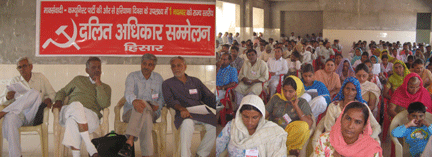 People's Democracy
People's Democracy
(Weekly
Organ of the Communist Party of India (Marxist)
No. 47
November 25, 2007
(Weekly
Organ of the Communist Party of India (Marxist)
|
Vol.
XXXI
No. 47 November 25, 2007 |
HARYANA
CPI(M) Organises Convention For Dalit Rights

Women (right) participating in good numbers in the convention
Inderjit Singh
DALIT Rights convention held at Hisar gave a call to all units of CPI(M) and activists to undertake campaigns and struggles on social issues along with the economic issues by giving required importance to the demands of scheduled caste sections. A state level convention of the Party organised on Haryana Day, the November 1, was attended by 300 participants including over 50 women and girls. The delegates comprised agricultural labourers, workers from the unorganised sector, employees, students and leading office bearers of mass organisations and the Party functionaries drawn from at least nine districts.
The convention was inaugurated by Inderjit Singh, state secretary of CPI(M) who initiated the discussions by explaining the background in which the meet was being held, as 60th anniversary of independence and 42nd anniversary of formation of Haryana state were being celebrated with tall claims of progress and development by the political establishment. He wondered over chief minister Bhupender Singh Hooda’s repeated boastings of making Haryana the number one state when one fifth of state’s population, the dalits continue to be haunted by increasing insecurity due to unabated intimidation and violent attacks from the dominating vested interests under the patronage of ruling class politics. The infamous incidents of dalit houses burnt down in Gohana, mass exodus of dalits few years back in Harsaula in Kaithal distrint, attack on dalits celebrating Ravidas Jayanti in Mohammadpur village in Karnal are only a few incidents pointing to the objective truth. These grim reminders must be able to falsify the bogus claims of development. The backward classes and other weaker sections like women too remain at the receiving end when law enforcing agencies blatantly refuse to protect them from the emboldened reactionary forces of caste and patriarchy.
Haryana is among the six states in the country with higher scheduled caste population of 19.5 per cent who are landless with no other sources of livelihood other than their physical labour. They continue to be most backward in terms of social indicators and economic status. Even the green revolution did not benefit them and rather deprived them of employment due to introduction of mechanised farming.
Inderjit referred to myths being often spread against dalits and caste prejudices that they have benefited a lot by way of reservations. Another myth is that caste discrimination is no more prevalent in Haryana. Such propaganda is affecting many, even some well meaning people. In fact, here lies the invisibility of the untouchability and discrimination on caste basis. Such an atmosphere of anti-people attitude of the rulers ultimately contributes to the perpetration of worst episodes like Duleena, in which five dalit youth were lynched five years ago and no one is punished. That there are shameless acts of violent attacks leading to fleeing of dalits from their own homes.
He exhorted the participants to ponder over the situation that is characterised by more and more marginalisation of dalits in the face of neo-liberal policies on the one hand and the divisive tactics of caste mobilisation for electoral ends adopted by ruling class political parties on the other hand.
He explained the distinct approach of the CPI(M) towards abolition of caste discrimination and prevention of caste atrocities as achieved to a great extent in the states ruled by Left Front like in West Bengal, Kerala and Tripura. This could be made possible through land struggles leading to land redistribution on the one hand and social reform movements on the other, before and after independence.
Prabhat Singh, Ram Kumar and Prem Chand formed the presidium in the forenoon session, in which Ram Kumar, state general secretary of Khet Mazdoor union read out the main resolution dealing with main aspects of the dalit problems in Haryana including their condition, signs of self assertion, the division within, trends of caste oppression in recent years, the effects of neo-liberal policies, condition of scheduled castes and scheduled tribes in Left Front ruled states, attitude of CPI(M) on caste and issues for struggles and campaigns.
The post lunch session was jointly presided by Satbir Singh, CITU state secretary, a leading activist of Sajai Karamcharkis and CPI(M) functionary, Chandgi Ram and Kamlesh Kumari belonging to Janvadi Mahila Samiti. In all, 24 participants took part in the discussion on the resolution. Many participants belonging to the scheduled caste background narrated their own personal experiences with regard to caste discrimination as well as accounts of experiences of organisation and struggles. These included Madan Bharti, Babu Lal, Dr Mahavir Narwal, Daya Nand advocate, Ram Chander Sanhal, Chhattar Pal Singh, Vikram Mittal, Suraj Bhan, O P Suthar, Rohtas Talao, Harpal Singh, Vinod Kumar, Kamlesh Kumari, Mukesh Kumar, Trilok Singh Kaithal, Suresh, Parbhat Singh and Satyawan. CPI(M) state secretariat member Surender Malik appealed the delegates to realise the seriousness of the social issues and summing up the discussions, he said the economic issues were very necessary but we shall be mistaken if social issues were ignored in our struggles. He explained how CPI(M) is aiming at people’s democratic revolution which needs class struggle in its holistic form. He pointed to the necessity of social reform movement even within the scheduled castes which should form the basis for creative agenda of dalit movement.
The convention concluded with a resolve to continue such useful exercise at all levels. The charter of campaign included guarantee for security of dalits and punishment to perpetrators of atrocities, creation of state SC commission in Haryana, residential plots to landless, strengthening of PDS, employment guarantee scheme in all districts, hostels for SC students, distribution of waste land to landless, insurance and veterinary care for sheep, piggery, protection of folk art and culture carried forward by dalits as a traditional occupation etc.